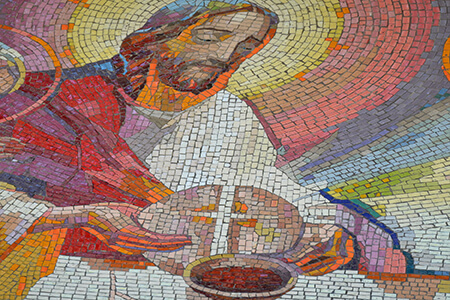 DT 8:2-3, 14B-16A
DT 8:2-3, 14B-16A
 1 Corinthians 10:16-17
1 Corinthians 10:16-17
 John 6:51 - 58
John 6:51 - 58
On the threshold of entering the Promised Land after 40 years in the wilderness of Sinai, Israel was asked by Moses to remember to observe God’s commandments, ordinances and statutes so that they might “have long life” (Dt. 6:2). “[N]ot by bread alone does one live”, he reminded them, “but by every word that comes forth from the mouth of the LORD” (Dt 8:3).
Before commencing the grand mission of establishing the Kingdom of God, and after fasting for 40 days and 40 nights in the desert of Judea, Jesus was tempted by the devil to change stones into loaves of bread. He responded by reciting the same Mosaic exhortation: "It is written: 'One does not live by bread alone, but by every word that comes forth from the mouth of God'" (Mt. 4:4).
Although the two events are more than a millennium apart, they share more similarities than differences:
- Moses is the liberator chosen by God to lead His people – Israel - out of the slavery of Egypt; Jesus is the Messiah anointed by God to liberate His people - the Church, the New Israel – from the enslavement of sin.
- Both events have the hardships and dangers of the desert as the backdrop.
- Both represent the dawning of a new era; one promises affluence and prosperity in a “land flowing with milk and honey”, the other guarantees eternal happiness and glory on the coming of the Kingdom of God in “the fullest of time” (Dt. 6:3, Gal 4:4-5).
- Both Moses and Jesus stress the importance of the word of God as the true source of life, comparing it to bread and upholding its definitive supremacy in the comparison.
- Most of all, life – how to live – is the dominant theme that penetrates and connects their messages.
Moses knew more than anyone else that observing the word of God – His commandments, ordinances and statutes – was the only way to live. A whole generation of Israelites - including Moses himself, who had to die on Mount Nebo, having seen from afar with his own eyes the land which God swore to Abraham, Isaac and Jacob - had to perish in the wilderness because they had failed to obey God’s commandments (Dt. 34:1-5).
Jesus, “the New Moses” as he is often called, also takes Moses’ position but extends its life-or-death implication to include eternal blessedness and damnation. After all, he is the Word of God (Jn 1:1); he is the “word that comes forth from the mouth of the Lord” that Moses referred to (Dt. 8:3). Like the Israelites who must observe the word of God or perish, we must listen to him or suffer eternal damnation. The Mosaic exhortation for Israel to love God “with all your heart, and with all your soul, and with all your strength” is pointing us to Jesus, the Word of God (Dt. 6:5). We must love him and unite ourselves with him until his very being – his Body and Blood, Soul and Divinity - is internalized in us, in the core of our being.
But how can we possibly do that? It’s not hard to see that this task is far beyond our human ability. In other words, it will take a miracle or some form of divine intervention to make it happen. Once again, it’s Jesus who has come to our rescue. To help us achieve this lofty and humanly impossible mission of becoming one with him, he has given us the Sacrament of the Eucharist, in which the whole substance of bread and wine is transformed into the substance of the body and blood of Christ through the mysterious power of transubstantiation (CCC 1376). We call the consecrated bread and wine the “Eucharist”.
Like Moses, Jesus - the New Moses - sees the observance of the word of God as a life-or-death issue, but the observance has been sacramentally transformed to enable us to accomplish what is humanly impossible to do: to share in his divine nature (cf. 2 Peter 1:4). “Amen, amen, I say to you, unless you eat the flesh of the Son of Man and drink his blood, you do not have life within you,” he insists in this Sunday’s gospel (Jn. 6:53). On this Solemnity of the Body and Blood of Christ, let’s remember the cry of the martyrs of Abitene, who were killed in 303 A.D. for celebrating Sunday Mass: “We cannot live without Sunday”. Yes, the Mass liturgy – and its culmination, the Eucharistic celebration – is that important. This is no exaggeration or fantasy; it is our Lord’s teaching.
